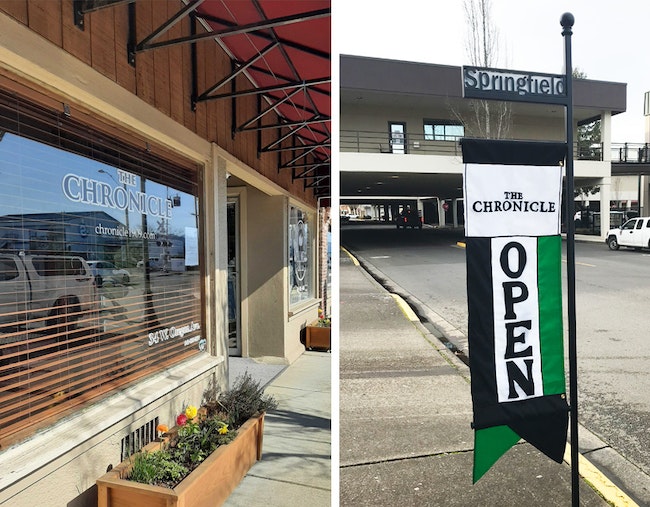 Small newspapers such as The Chronicle, which serves Springfield, Creswell and Cottage Grove, would be unfairly penalized under Oregon Sen. Lee Beyer’s “Plastic Pollution and Recycling Modernization Act” (Senate Bill 582).
Small newspapers such as The Chronicle, which serves Springfield, Creswell and Cottage Grove, would be unfairly penalized under Oregon Sen. Lee Beyer’s “Plastic Pollution and Recycling Modernization Act” (Senate Bill 582).
In the late 1980s, barges of waste were sailing across U.S. waterways with no place to call home, in response to “not in my backyard” opposition to the siting of new landfills in certain states. Wanting to help, newspaper publishers set out to find a solution to the waste problem and called on their suppliers to use more old newspapers to produce new newsprint. In Oregon, newspaper publishers agreed to voluntarily increase their use of recycled-content newsprint, which prompted similar commitments by other publishers in states around the country.
Paper producers responded to newspaper publishers’ call to action by investing in recycling equipment and using old newspapers to produce new newsprint, as well as other paper products, such as linerboard, tissue and cellulose material. This commitment to recycling helped increase the newspaper recycling rate from 35 percent in 1989 to more than 64.8 percent today. In addition, the overall effort to recycle paper has become a well-documented success unmatched by other industry sectors that produce consumer goods. According to the U.S. Environmental Protection Agency (EPA), in 2018, the paper recycling rate was 68.2 percent, compared to 25 percent for glass, 17.2 percent for aluminum and 8.5 percent for plastic.
Oregon Senator Lee Beyer has introduced the “Plastic Pollution and Recycling Modernization Act” (Senate Bill 582), which would require producers of packaging (plastic, glass, metal, etc.) and paper products to develop a “producer responsibility plan” and pay fees into a Producer Responsibility Organization that, among other things, would help subsidize municipal recycling programs throughout the state. Newspapers and magazine publishers would be required to either pay the fees or, as a substitute, provide “in-kind” advertising that would promote and educate the public on recycling.
While the legislation is well-intended, it creates a couple of major problems and should be changed in the legislature or when the bill reaches Governor Kate Brown’s desk. First, a government mandate requiring newspapers to provide free, “in-kind” advertising is unconstitutional on its face, as it is “compelled speech.” Courts have ruled that the government cannot mandate the publishing of government messages as a way of complying with certain requirements of state law (Miami Herald v. Tornillo; Washington Post v. McManus). Newspapers regularly provide “in-kind” advertising in support of local and national causes (e.g., Ad Council campaigns); however, “in-kind” means providing a voluntary service. The Oregon Newspaper Publishers Association and its member newspapers will support Oregon’s recycling efforts – which possibly could include advertising on its platforms – but a mandate from the state will not survive constitutional scrutiny. The newspaper industry has always taken its role of supporting the success of recycling programs in the communities that we serve seriously, and this time is no different.
Second, the producer fees outlined in the legislation would punish newspapers and magazines that, through their early, voluntary efforts, have a demonstrated success in recycling and today are not a large part of the municipal waste stream. According to data from the EPA, newspapers and magazines represent only 1.7 percent and 0.3 percent of our nation’s municipal waste stream, respectively. These fees, which essentially amount to new taxes, come at a time when the COVID-19 pandemic has hit newspapers – and their customers – especially hard. Many newspapers have voluntarily donated advertising space to help small- and medium-sized businesses rebuild after the pandemic’s devastating economic blow. These fees proposed in the bill will lead to higher advertising rates for businesses at time when we should be encouraging economic activity in local communities, not discouraging it. If these fees are approved, newspapers, which are currently facing well-documented economic challenges, will be forced to cut costs, which could lead to a reduction in newsroom jobs and/or a decrease in the amount of news and information provided to Oregon communities, particularly in rural areas. For some small market newspapers, this could be the tipping point in whether their doors can stay open.
We hope the Oregon Legislature and Governor Brown will consider the negative impact of SB 582 on local newspapers, which provide critical access to factual and trusted news. For many communities throughout Oregon, print newspapers are the sole source of local news. We also encourage policymakers to focus on hard-to-recycle materials, rather than products such as newspapers, which through the industry’s voluntary, proactive efforts early on, have implemented effective recycling programs and demonstrated significant success. Newspapers, for their part, will continue to play an important role in educating the public on environmental issues and the value of participating in community recycling programs, including the importance of separating contaminants from municipal recycling bins to increase the value of recovered materials.
David Chavern is President & CEO of the News Media Alliance, based just outside Washington, D.C., in Arlington, VA, representing the interests of approximately 2,000 news publishers across the United States.







